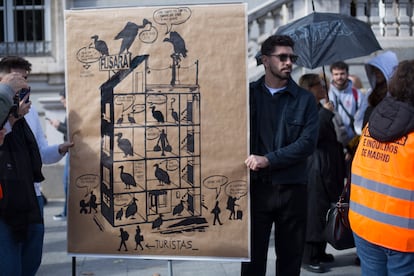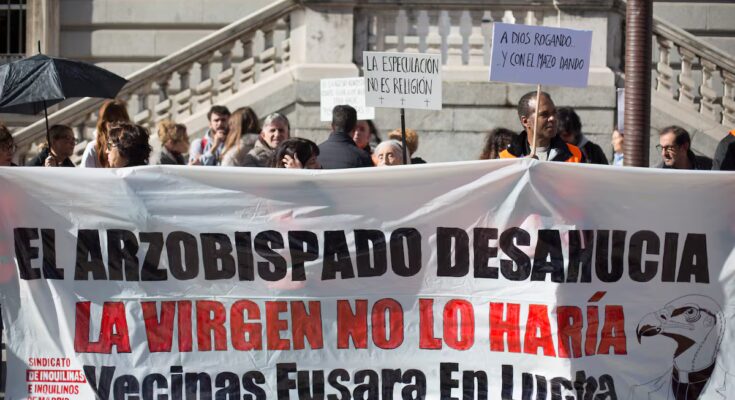With shouts of “Speculating is a cardinal sin” and “The Archbishopric has made a deal with the vultures”, nearly 100 residents whose homes are managed by a foundation dependent on the Archbishopric of Madrid gathered this Sunday in front of the ecclesiastical headquarters to ask that their sale not take place. The Court of Education number 28 will have to decide whether to maintain precautionary measures on the sale of 13 properties located in the center of the capital to the Tapiamar company, an operation paralyzed in 2019 due to alleged irregularities and which, if carried out, would expel around 200 families from their homes.
The properties in question, located in streets such as Fuencarral, Churruca or San Bernardo, are managed by the Fusara Foundation, an organization whose aim is to “educate minors without economic resources” and created in 2008 from the merger of two foundations that owned numerous properties. With them they provided funds to orphanages, charter schools and residences. “This real estate which has a social purpose is not the property of the Archbishopric, who is the one who manages it. The owners are the universal heirs, who are the poor children of Madrid and its province, as established in the original statutes of 1925. They are selling something that is not theirs”, summarizes Jesús Manrique, one of the affected tenants.
Last July it was learned that the archdiocese of the Community of Madrid had reached an out-of-court agreement for the sale of the 13 properties for a total of 99 million euros. According to neighbors’ estimates, its current price would be around 250 million. This agreement represents the continuation of a sale blocked in 2019 and ended up in court due to complaints of irregularities presented by tenants. At the time the deal was worth 65 million and also included a building in calle Barquillo 22, where Fusara’s headquarters are located.
To carry out this operation, 14 companies were created in just two months with a capital of 3,010 euros each. All under the Tapiamar umbrella and managed by the same person: Roberto de Juan González. In the new agreement, De Juan remains the buyer and Daniel Hidalgo Pita is included, both accused of corruption and fraud in the Foundations case. In this case, the leaders of Fusara and Tapiamar are being investigated on charges of looting Church assets in the center of the capital and distributing commissions.
“What adjective is given to the Church that sells these 13 buildings to buyers accused of fraud and corruption. It is a fraudulent deal and it is clear that they want to throw us out of our homes to build tourist apartments or hotels”, insists Manrique, holding the megaphone with which he leads the protest songs.
Last October, the Provincial Court of Madrid confirmed the accusation against De Juan and Hidalgo, along with a dozen other defendants, without knowing the position of the Prosecutor’s Office. The judge of the 28th Investigative Court asked the parties to hand over the indictments to start the trial six years later. Contacted by this newspaper, the Archbishopric did not issue any statement and postponed the response to Fusara.
The foundation distances itself from the administration that reached the 2019 agreement and justifies the new agreement with economic necessity: “Fusara has not owned these properties since 2019. That operation, approved with false information, was harmful to the foundation and for this reason we have filed a complaint against whoever carried it out. The sale deprived the organization of the revenue that financed its work: the education and reception of hundreds of minors at risk of exclusion through its schools and residences. They are the ones the real beneficiaries and our To avoid liquidation, last July the foundation reached an agreement with the purchasing company to pay for the properties at the market price.

However, the outcome of a sale that neighbors are unwilling to allow is still unclear. In September, despite the damage acknowledged, Fusara withdrew from the private prosecution against Tapiamar, as part of the new agreement. The tenants have appealed against the operation, considering it the consummation of the scam, as the properties continue to be sold well below their market value. Furthermore, the neighbors’ lawyer and resident of one of the buildings, Monica Sevil, insists on underlining that Fusara continues to be responsible for the properties due to the suspension of the 2019 agreement.
This situation only increases the uncertainty that residents have been living with ever since. This is the case of Aurora Alonso, who at 84 years old continues to live in the house in Angosta de los Mancebos where she was born. Holding a small banner reading “Speculation is not religion”, he laments the six years of uncertainty and lack of transparency on the part of the Archbishopric.
“We received eviction letters in 2019 without any warning,” he recalls before admitting his fear that his homes will be used for tourist activities and criticizing the lack of alternatives. “I live by watching who enters the building. People we don’t know come to take measurements. They haven’t even acknowledged what they want to do with our homes or offered an alternative,” says the woman who wishes she didn’t have to pack her bags for an uncertain destination, after living in the same place her whole life.



